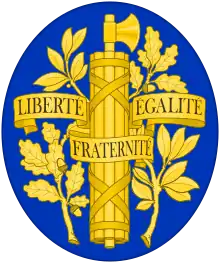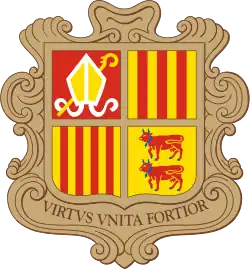 |
|---|
 |
|---|
| Constitution |
|
|
The president of France (ex officio also a co-prince of Andorra) is elected every five years.
Until 2002, the elections were held every seven years.[1] They are always held on a Sunday.[2] Since 1965 the president has been elected by direct popular vote.[3][4][5] Candidates appear on the ballot after the Constitutional Council has validated their candidacy. Should no candidate receive over 50% of the vote in the first round, a second round is organised two weeks later with the top two contenders.
Candidates in presidential elections in France have the right to visit French military bases on national soil and abroad to gain a better understanding of the French Armed Forces, although they are prohibited from using such visits for campaign events.[6] Depending on their respective results in the election, they are eligible to different modalities of reimbursement of their campaign expenses by the state.[7] The state also monitors appearances on television and radio programmes through its Regulatory Authority for Audiovisual and Digital Communication (ARCOM) to ensure equal airtime between candidates during the campaign; each candidate has the right to a certain amount of time not to be exceeded per media platform.[8]
History
Second Republic
There was one presidential election in France during the government known as the Second Republic (1848–1851). It was held in 1848. The president was elected by direct popular vote.
Third Republic
There were 15 presidential elections in France during the government known as the Third Republic (1870–1940).
According to the Constitutional Laws of 1875, the President was elected by an absolute majority of votes by the two houses of the Parliament assembled at the National Assembly.
Fourth Republic
There were two presidential elections in France during the republican government known as the Fourth Republic (1946–1958). They were held in 1947 and 1953.
The president was elected by the Congress of the French Parliament, a joint meeting of both houses of the French Parliament[9] (the National Assembly and the Council of the Republic).
Fifth Republic
There have been twelve presidential elections in France since the establishment of the Fifth Republic in 1958.
Originally the president was elected by an electoral college comprising the members of French Parliament, the general councils and the assemblies of the overseas territories, as well as the elected representatives of the municipal councils.[10] This electoral college included around 80,000 departmental and municipal councillors (who had been elected locally).[9]
Following constitutional reform in November 1962 (the constitutional Act of 6 November), pushed by President Charles de Gaulle, the president has been directly elected by the people of France in a two-round election.[11]
Until a 24 September 2000 constitutional referendum, the president had been elected for a seven-year term since 1958. With the referendum being successful, the term was reduced to five years. Therefore once the winner of the 2002 election, Jacques Chirac, took office as president, the next election was scheduled for 2007 rather than 2009.[11] The French constitutional law of 23 July 2008 proposed by President Nicolas Sarkozy following an election pledge introduced term limits. No president can be reelected to a third consecutive term; any president can however run for a third term after having left office.[12]
Currently, the President of the French Republic is elected to a five-year term in a two-round election under Article 7 of the Constitution: if no candidate secures an absolute majority (including blank and void ballots) of votes in the first round, a second round is held two weeks later between the two candidates who received the most votes.[13] As of 2022 every election since the direct election system was introduced has gone to a second round.
The most recent election took place in 2022, with the first round being held on 10 April and the second round on 24 April.
See also
References
- ↑ Dennis C. Mueller (17 February 2003). Public Choice III. Cambridge University Press. pp. 433–. ISBN 978-0-521-89475-3.
- ↑ "When is the French Presidential Election 2017, how does it work and who are the candidates?". The Telegraph. 2017-04-22. Retrieved 2017-04-22.
- ↑ "France at the Polls: The Presidential Election of 1974". AEI. 2017-07-29. Retrieved 2017-04-23.
- ↑ William G. Mayer (2004). The Making of the Presidential Candidates 2004. Rowman & Littlefield. pp. 266–. ISBN 978-0-7425-2919-9.
direct vote France since 1965.
- ↑ Robert Wistrich (2 September 2003). Terms of Survival: The Jewish World Since 1945. Routledge. pp. 226–. ISBN 978-1-134-85579-7.
- ↑ "Visite critiquée en Côte d’Ivoire : Zemmour dit avoir respecté «scrupuleusement» les conditions exigées", Le Parisien (in French), 24 December 2021.
- ↑ "Quels sont les seuils de remboursement des frais de campagne ?, Constitutional Council of France via presidentielle2022.conseil-constitutionnel.fr.
- ↑ "Présidentielle : comment le temps d’antenne des candidats est-il calculé ?", Ouest-France (in French), 28 March 2022.
- 1 2 Philip Thody (1989). French Caesarism from Napoleon I to Charles de Gaulle. Palgrave Macmillan UK. pp. 105–. ISBN 978-1-349-20089-4.
- ↑ "Constitution du 4 octobre 1958 - Texte originel - Sénat". www.senat.fr. Retrieved 2021-04-13.
- 1 2 Susana Galera (1 January 2010). Judicial Review: A Comparative Analysis Inside the European Legal System. Council of Europe. pp. 71–. ISBN 978-92-871-6723-1.
- ↑ "Combien de fois un candidat peut-il se présenter ?", Le Point (in French), 16 August 2016.
- ↑ "Constitution du 4 octobre 1958 - Article 7". Légifrance. Retrieved 22 February 2017.